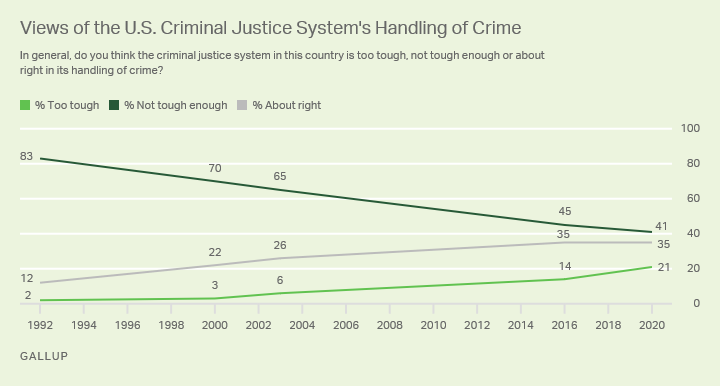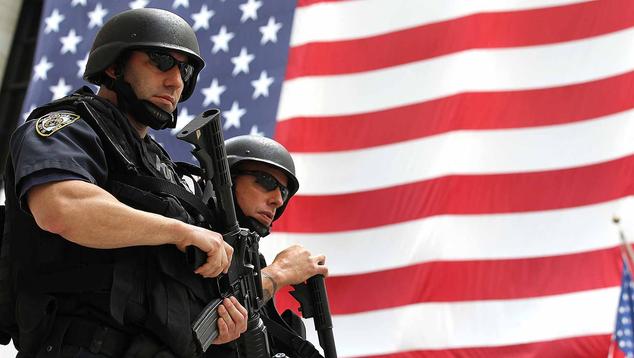Story Highlights
- 41% say justice system is "not tough enough," while 21% say it's "too tough"
- 63% favor addressing social and economic problems to lower the crime rate
- 34% support putting more money and effort into strengthening law enforcement
WASHINGTON, D.C. -- Americans' belief that the U.S. criminal justice system is "not tough enough" on crime is now half of what it was in Gallup's initial reading of 83% in 1992. The latest measure, at 41%, is the lowest on record and down slightly from the previous reading in 2016 -- although it remains the view of the plurality. At the same time, there has been a seven-percentage-point uptick among those who say the system is "too tough" (21%) and no change among those who think it is "about right" (35%).

Line graph. Americans' perceptions of whether the criminal justice system in the U.S. is too tough, not tough enough or about right in its handling of crime since 1992. The percentage saying it is not tough enough has fallen from 83% in 1992 to 41% now. At the same time, the percentage saying it is about right has risen from 12% in 1992 to the current 35%, and those who think it is too tough has increased from 2% in 1992 to 21% now.
Across the five times Gallup has asked this question since 1992, when public perceptions of national and local crime rates were at or near their highest points, there has been a steady decrease in the percentage saying the system is not tough enough and increases in the percentages saying it is too tough or about right. These changes coincide with declines in crime rates in the U.S.
The latest reading is from Gallup's annual Crime poll, conducted Sept. 30-Oct. 15, 2020.
Americans' faith in the U.S. criminal justice system remains low according to Gallup's 2020 Confidence in Institutions poll conducted earlier this year, and confidence in one element of that system -- the police -- fell to a record-low level in the same poll. This decline in confidence in the police followed several high-profile deaths of Black Americans at the hands of police officers, including George Floyd, Breonna Taylor and Rayshard Brooks.
Views of the criminal justice system vary by party identification and racial background. A 58% majority of Republicans and Republican-leaning independents say the criminal justice system is not tough enough. However, this view is shared by less than half as many Democrats and Democratic-leaning independents (25%), while 37% think the system is about right and 35% too tough.
More White Americans than non-White Americans say the justice system is not tough enough on crime (45% vs. 31%, respectively). The plurality of non-White adults, 40%, think it is about right, while 26% believe it is too tough.
Americans across these four party and racial subgroups have become significantly less likely to say the criminal justice system is not tough enough, but it has declined the most among Democrats, falling from 62% in 2000 to 25% today. Over the same period, Democrats' view that the system is too tough has grown from 6% to 35%.
| Too tough | About right | Not tough enough | ||||||||||||||||||||||||||||||||||||||||||||||||||||||||||||||||||||||||||||||||||||||||||||||||||
|---|---|---|---|---|---|---|---|---|---|---|---|---|---|---|---|---|---|---|---|---|---|---|---|---|---|---|---|---|---|---|---|---|---|---|---|---|---|---|---|---|---|---|---|---|---|---|---|---|---|---|---|---|---|---|---|---|---|---|---|---|---|---|---|---|---|---|---|---|---|---|---|---|---|---|---|---|---|---|---|---|---|---|---|---|---|---|---|---|---|---|---|---|---|---|---|---|---|---|---|---|
| % | % | % | ||||||||||||||||||||||||||||||||||||||||||||||||||||||||||||||||||||||||||||||||||||||||||||||||||
| Republicans/Republican-leaning independents | ||||||||||||||||||||||||||||||||||||||||||||||||||||||||||||||||||||||||||||||||||||||||||||||||||||
| 2020 | 6 | 34 | 58 | |||||||||||||||||||||||||||||||||||||||||||||||||||||||||||||||||||||||||||||||||||||||||||||||||
| 2016 | 2 | 30 | 65 | |||||||||||||||||||||||||||||||||||||||||||||||||||||||||||||||||||||||||||||||||||||||||||||||||
| 2003 | 2 | 25 | 72 | |||||||||||||||||||||||||||||||||||||||||||||||||||||||||||||||||||||||||||||||||||||||||||||||||
| 2000 | 1 | 16 | 79 | |||||||||||||||||||||||||||||||||||||||||||||||||||||||||||||||||||||||||||||||||||||||||||||||||
| Democrats/Democratic-leaning independents | ||||||||||||||||||||||||||||||||||||||||||||||||||||||||||||||||||||||||||||||||||||||||||||||||||||
| 2020 | 35 | 37 | 25 | |||||||||||||||||||||||||||||||||||||||||||||||||||||||||||||||||||||||||||||||||||||||||||||||||
| 2016 | 22 | 42 | 29 | |||||||||||||||||||||||||||||||||||||||||||||||||||||||||||||||||||||||||||||||||||||||||||||||||
| 2003 | 9 | 29 | 58 | |||||||||||||||||||||||||||||||||||||||||||||||||||||||||||||||||||||||||||||||||||||||||||||||||
| 2000 | 6 | 27 | 62 | |||||||||||||||||||||||||||||||||||||||||||||||||||||||||||||||||||||||||||||||||||||||||||||||||
| White adults | ||||||||||||||||||||||||||||||||||||||||||||||||||||||||||||||||||||||||||||||||||||||||||||||||||||
| 2020 | 19 | 33 | 45 | |||||||||||||||||||||||||||||||||||||||||||||||||||||||||||||||||||||||||||||||||||||||||||||||||
| 2016 | 10 | 32 | 53 | |||||||||||||||||||||||||||||||||||||||||||||||||||||||||||||||||||||||||||||||||||||||||||||||||
| 2003 | 6 | 25 | 67 | |||||||||||||||||||||||||||||||||||||||||||||||||||||||||||||||||||||||||||||||||||||||||||||||||
| 2000 | 3 | 21 | 72 | |||||||||||||||||||||||||||||||||||||||||||||||||||||||||||||||||||||||||||||||||||||||||||||||||
| Non-White adults | ||||||||||||||||||||||||||||||||||||||||||||||||||||||||||||||||||||||||||||||||||||||||||||||||||||
| 2020 | 26 | 40 | 31 | |||||||||||||||||||||||||||||||||||||||||||||||||||||||||||||||||||||||||||||||||||||||||||||||||
| 2016 | 23 | 40 | 30 | |||||||||||||||||||||||||||||||||||||||||||||||||||||||||||||||||||||||||||||||||||||||||||||||||
| 2003 | 8 | 28 | 57 | |||||||||||||||||||||||||||||||||||||||||||||||||||||||||||||||||||||||||||||||||||||||||||||||||
| 2000 | 7 | 28 | 57 | |||||||||||||||||||||||||||||||||||||||||||||||||||||||||||||||||||||||||||||||||||||||||||||||||
| GALLUP | ||||||||||||||||||||||||||||||||||||||||||||||||||||||||||||||||||||||||||||||||||||||||||||||||||||
More Want to Cut Crime by Focusing on Social Problems Than Law Enforcement
Given two options for approaches to lowering the U.S. crime rate, more Americans prefer putting money and effort into addressing social and economic problems such as drug addiction, homelessness and mental health (63%) rather than putting money and effort into strengthening law enforcement (34%).
While almost nine in 10 Democrats and Democratic leaners favor focusing on social and economic problems, more than six in 10 Republicans and Republican leaners would rather strengthen law enforcement.
Majorities of White and non-White adults favor addressing the systemic problems that contribute to crime; however, White adults are less likely than non-White adults to prioritize this approach.
| Address social problems | Strengthen law enforcement | ||||||||||||||||||||||||||||||||||||||||||||||||||||||||||||||||||||||||||||||||||||||||||||||||||
|---|---|---|---|---|---|---|---|---|---|---|---|---|---|---|---|---|---|---|---|---|---|---|---|---|---|---|---|---|---|---|---|---|---|---|---|---|---|---|---|---|---|---|---|---|---|---|---|---|---|---|---|---|---|---|---|---|---|---|---|---|---|---|---|---|---|---|---|---|---|---|---|---|---|---|---|---|---|---|---|---|---|---|---|---|---|---|---|---|---|---|---|---|---|---|---|---|---|---|---|
| % | % | ||||||||||||||||||||||||||||||||||||||||||||||||||||||||||||||||||||||||||||||||||||||||||||||||||
| U.S. adults | 63 | 34 | |||||||||||||||||||||||||||||||||||||||||||||||||||||||||||||||||||||||||||||||||||||||||||||||||
| Republicans/Republican-leaning independents | 34 | 62 | |||||||||||||||||||||||||||||||||||||||||||||||||||||||||||||||||||||||||||||||||||||||||||||||||
| Democrats/Democratic-leaning independents | 87 | 11 | |||||||||||||||||||||||||||||||||||||||||||||||||||||||||||||||||||||||||||||||||||||||||||||||||
| White adults | 59 | 39 | |||||||||||||||||||||||||||||||||||||||||||||||||||||||||||||||||||||||||||||||||||||||||||||||||
| Non-White adults | 73 | 24 | |||||||||||||||||||||||||||||||||||||||||||||||||||||||||||||||||||||||||||||||||||||||||||||||||
| Gallup, Sept. 30-Oct. 15, 2020 | |||||||||||||||||||||||||||||||||||||||||||||||||||||||||||||||||||||||||||||||||||||||||||||||||||
As would be expected, those who think the criminal justice system is too tough or about right in its handling of crime strongly favor putting money and effort into tackling social and economic problems to cut the crime rate (88% and 69%, respectively). That view is shared by 45% of those who do not think the system is tough enough in its handling of crime. The majority of this group, 53%, supports strengthening law enforcement.
Bottom Line
At a time when confidence in the criminal justice system is low and perceptions that crime in the U.S. are up, Americans are divided in their views of how the criminal justice system is handling crime. Although a plurality still think the system is not tough enough, the percentage who say it is too tough has risen in the past year. This is likely attributable, at least in part, to the backlash that has resulted from several highly publicized deaths of Black Americans at the hands of police officers.
Recent Gallup polling shows that Americans favor a number of reforms to policing in the U.S., and the public widely supports putting money and effort into addressing social and economic problems that can lead to crime over putting those resources into strengthening law enforcement.
View complete question responses and trends (PDF download).
Learn more about how the Gallup Poll Social Series works.




